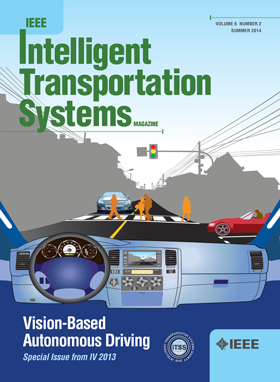Safe Reinforcement Learning-Based Eco-Driving Control for Mixed Traffic Flows With Disturbances
IF 7.9
1区 工程技术
Q1 ENGINEERING, CIVIL
IEEE Transactions on Intelligent Transportation Systems
Pub Date : 2025-03-04
DOI:10.1109/TITS.2025.3544812
引用次数: 0
Abstract
This paper presents a safe learning-based eco-driving framework tailored for mixed traffic flows, which aims to optimize energy efficiency while guaranteeing system constraints during real-system operations. Even though reinforcement learning (RL) is capable of optimizing energy efficiency in intricate environments, it is challenged by safety requirements during both the training and deployment stages. The lack of safety guarantees impedes the application of RL to real-world problems. Compared with RL, model predicted control (MPC) can handle constrained dynamics systems, ensuring safe driving. However, the major challenges lie in complicated eco-driving tasks and the presence of disturbances, which pose difficulties for MPC design and constraint satisfaction. To address these limitations, the proposed framework incorporates the tube-based enhanced MPC (RMPC) to ensure the safe execution of the RL policy under disturbances, thereby improving the control robustness. RL not only optimizes the energy efficiency of the connected and automated vehicle in mixed traffic but also handles more uncertain scenarios, in which the energy consumption of the human-driven vehicle and its diverse and stochastic driving behaviors are considered in the optimization framework. Simulation results demonstrate that the proposed algorithm achieves an average improvement of 10.88% in holistic energy efficiency compared to the RMPC technique, while effectively preventing inter-vehicle collisions when compared to the RL algorithm.基于强化学习的安全生态驾驶控制,适用于有干扰的混合交通流
本文章由计算机程序翻译,如有差异,请以英文原文为准。
求助全文
约1分钟内获得全文
求助全文
来源期刊

IEEE Transactions on Intelligent Transportation Systems
工程技术-工程:电子与电气
CiteScore
14.80
自引率
12.90%
发文量
1872
审稿时长
7.5 months
期刊介绍:
The theoretical, experimental and operational aspects of electrical and electronics engineering and information technologies as applied to Intelligent Transportation Systems (ITS). Intelligent Transportation Systems are defined as those systems utilizing synergistic technologies and systems engineering concepts to develop and improve transportation systems of all kinds. The scope of this interdisciplinary activity includes the promotion, consolidation and coordination of ITS technical activities among IEEE entities, and providing a focus for cooperative activities, both internally and externally.
 求助内容:
求助内容: 应助结果提醒方式:
应助结果提醒方式:


